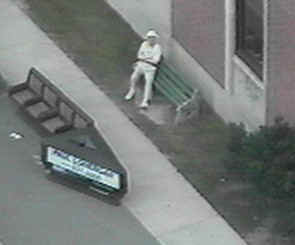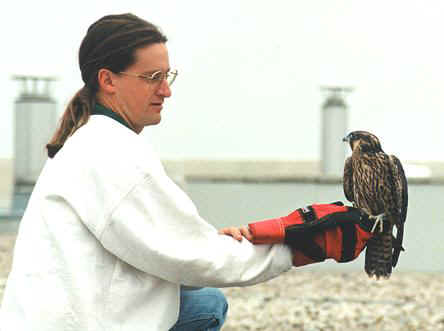The Canadian Peregrine
Foundation
Project Watch-'em
Peregrine Falcons at urban nest sites are very vulnerable during their first few weeks
of flight. Some take off before their flight muscles are fully developed, and end up
on the streets below amid busy pedestrian and vehicle traffic, while others learn the hard
way that buildings with glass walls need to be avoided. Project Watch-'em is
dedicated to ensuring that help is immediately available for fledgling peregrines when
they need it.
| Usually Project Watch-'em operates for
approximately two weeks at each of the nest sites (longer at sites where birds are being
hacked through Project Release). The watch begins when the chicks are five to six
weeks old, and have acquired a full set of flight feathers. It is the first flight
of a chick which is often the most treacherous, therefore the watch is usually started a
few days before the chicks are expected to fly, just in case they decide to go early.
Once the watch has started, volunteers are on the scene from dawn
to dusk every day for about two weeks, or until the fledglings are demonstrating that they
have learned how to fly safely. |
| Each site has at least one coordinator, who
is responsible for organizing the volunteers, and for making decisions about the birds
when necessary. At any given time, one of the coordinators is on scene, as well as
several volunteers. Volunteers are asked to sign up for certain time periods on a
schedule, helping the coordinators ensure that there are always enough pairs of eyes
available to watch the birds.
All
volunteers at each site are in constant communication with each other via walkie-talkies
or cell phone / radio units. This makes it possible to track the birds much more
easily, and is invaluable when attempting to coordinate a rescue. |

Volunteers position themselves at sites around each nest to watch the activities of the
young birds.
(Photo by Mark Nash)
|
| The volunteer watch is a sort of safety net
for the fledglings, and in an ideal situation, they never need to take advantage of it.
However, we have learned from experience that at most urban nest sites, at least
one of the chicks is likely to require human assistance soon after leaving the nest. |

Mark Heaton of the Ontario Ministry of Natural Resources, about to release Windwhistler
from the roof of the Mutual Group Centre, the morning after Windwhistler had been rescued
from a second floor terrace. Windwhistler has since established a
territory for himself in Midtown Toronto.
(Photo by Marcel Gahbauer)
|
If a peregrine is injured or comes down to
the ground, the situation is assessed by the site coordinator, and an attempt to rescue
the bird is made unless doing so will further endanger the bird. Care must be taken
when handling the peregrine in case it has injured itself. Even if the bird is not
injured, rescue may still be necessary. Some peregrines simply don't have the muscle
strength to maintain altitude, and drift to the ground, without ever colliding with
anything. Once they reach the ground, the parents may not feed them anymore, and the
young birds will not be able to gather the strength to fly back up to the rooftops. |
As a volunteer,
you will have a rare opportunity to observe in detail the fascinating behaviour of
peregrine falcons, and will meet many other people who share an interest in looking out
for the welfare of these birds. In 2001, the Canadian Peregrine Foundation will be
organizing the Fledgling Watches in Toronto, Etobicoke, and possibly
additional sites to be announced later. Please contact us for more information on how you can help at
these sites. |
We are looking for sponsors to help us fund Project
Watch-'em. Please contact us if you can help,
or know of someone who might be able to.
If you have any questions, comments, or
suggestions about Project Watch-'em, please e-mail us.
RETURN TO COMPLETE SITE INDEX
(or choose from selected popular links below)
CPF INFORMATION:
| Home | News
| Talon Tales | Search
|
| Membership | Adopt a Peregrine | Gift Shop |
| About CPF | CPF Projects |
Project Track-'em | Education Program |
BIRD INFORMATION:
| Webcams | Photo Galleries |
Sightings | Raptor Identification and Photo Gallery |
| Peregrine information | Owls
| Other Raptors | Links |
©
Canadian Peregrine Foundation

